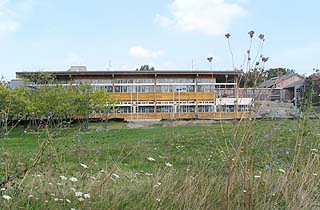
Surveys
DJC.COM
November 18, 2004
Commissioning squeezes the best out of buildings
Heery International

Photo courtesy Miller|Hull
Heery International is commissioning Merrill Hall on UW's Seattle campus to help it get a silver LEED rating.
|
Performance is a critical word at the University of Washington. Through its core mission of education, administrators and educators strive to elicit the best performance from each student.
Of course, student performance is driven not just by instructor quality, but by the quality of the facilities where they live, learn and work. Consequently, facilities must be high performing, too.
Savvy administrators know that high performing facilities not only impact student comfort but the school's financial bottom line.
Commissioning is one of the ways the university shows its commitment to its students, along with good business practice and a concern for the environment. The school requires commissioning for all new and renovated facilities, according to Bill Earhart, University of Washington senior facilities engineer. A number of them are managed by third party commissioning agents.
Some of the key issues the university addresses through commissioning include whether facility support systems have been installed properly. Is the air flow appropriate? Does the HVAC equipment turn on at the right time to ensure comfort? Do systems operate for peak energy efficiency? Are systems easy to understand and maintain?
"Essentially, commissioning is the verification and validation of system and component performance and operations," said Matt Beckingham, a senior associate with the Seattle facility services arm of Heery International.
Heery has been retained to manage a variety of commissioning projects for the university.
"A lot of people think the university is set up to allow a full-time operations employee per building," Earhart said. "In truth, we might have one control technician per 15 buildings on the main Seattle campus. For this reason, it's important for our systems to operate as intended from the start. Our staff also needs good records (commissioning documents) to understand how a system was put together and why it operates as it does."
Complexity drives demand
"Buildings at the university tend to be fairly complex in terms of HVAC and laboratory systems," said Norm Menter, project manager in UW's capital projects office. "When it comes to proper installation and function, I have no way to judge who among the engineers, contractors or architects is telling me the right story. Heery's commissioning team is my expert as well as my advocate."
Merrill Hall has been one of the challenging buildings on the UW's Seattle campus that Heery is involved with.
"At only 20,000 square feet, Merrill Hall is unique among campus buildings," said Doyle Hughes, Heery commissioning agent. "Despite its size, the building has four science labs with fume hoods and separate control systems.
"Because it also houses a horticultural library, it requires excellent lighting as well as a quiet HVAC system. There's also a greenhouse and space set aside for other outreach programs. The amount of equipment in the mechanical room is pretty unbelievable."
In reality, the facility houses four buildings in one, each with its own complexity.
"I don't know if most people realize the complexities involved where science buildings and HVAC systems are concerned," Earhart said. "Our goal is to provide and maintain safe, comfortable working conditions for students, researchers, and staff."
Earhart credited commissioning agents with discovering 25 heating valves that didn't close tightly in another campus building. "Those valves allowed hot water into the science building even when we were trying to send cool air. We were just wasting energy."
Finding the root cause of the problem, not just the symptom, is a commissioning firm's goal.
"We might find improper air or water flow," Beckingham said. "The actual cause of the problem, though, may be that the logic of the building control software is wrong."
Understanding design logic
Beckingham said commissioning agents should get involved in the design phase to study not only system specifications, but also control software.
The software is written to turn on and shut off fans, for example. The fans then trigger other equipment activity.
"Often, there's a statement in the middle of the software that gets ignored," Beckingham said. "It may not be discovered until an emergency generator goes on.
"We ask the controls contractor to walk us through automated systems logic to help us understand exactly what the systems are meant to do and then put them through their sequences."
The more commissioning agents can study systems before their installation, the easier they make life for the operations staff once the building is up and running. Given financial limitations, schools are looking for ease of maintenance.
The bottom line
"When commissioning is properly executed, operational cost savings can be substantial," said Rick Fedrizzi, founder and CEO of the U.S. Green Building Council, a nonprofit organization that promotes environmentally responsible building practices. "Commissioning often increases energy efficiency by 5 to 10 percent."
The Oregon Office of Energy studied direct energy savings for two buildings after applying commissioning. "In a 110,000-square-foot building, energy savings of $12,276 per year (12 cents per square foot) were realized," Fedrizzi said. "In a 22,000-square-foot office building, energy savings of $7,600 per year (35 cents per square foot) were achieved."
Menter said commissioning makes good business sense. The university will test that belief by extending the process at Merrill Hall. Post-occupancy re-commissioning will help the facility earn points required to receive a silver LEED rating when the university submits its documentation later this year.
"As occupants move in, they'll have their own modifications for operating systems," Menter said.
Heery will return in 10 months to re-commission and recalibrate the system to make sure the design is running at optimum levels for comfort and efficiency. "Merrill Hall will operate at least 20 percent below the American Society of Heating, Refrigeration and Air-Conditioning Engineers' standards," Menter said. "I believe we'll see significant energy savings over time."
Heery mechanical engineer Marty Novini said more universities will look to commissioning to enhance facility comfort and operations.
"According to a Department of Energy study, a building's use changes every 25 years," Novini said. "Mechanical systems are typically not sufficient to meet those changing needs. By adjusting the systems, not only can we meet the building's needs for the future, we can do it in as cost and energy efficient manner as possible."
Sue Wasserman is public relations manager at Heery International, a 1,000-person architecture, engineering, project management and interior design firm. The company's Northwest regional headquarters is located in Seattle.
Other Stories:
- A new Rx for emergency room design
- Preparing the next design pioneers
- A new tool for analyzing seismic hazards
- Don't sacrifice green design to 'value engineering'
- How buildings can help 'reforest' a city
- Opportunities abound in China for A/E firms
- What owners need to know about seismic design
- Unique design brings Boeing workers together
- Ready to go national with your design firm?
- A/E firms look to plastic for growth
- Skinner Building gets a seismic skeleton
- Waterlogged walls? New system will tell you
- Designers — beware of technology convergence
- A past blast: building the road to St. Helens
- Peering into the future of urban supermarkets
- Designers have lofty aspirations for housing
Copyright ©2009 Seattle Daily Journal and DJC.COM.
Comments? Questions? Contact us.